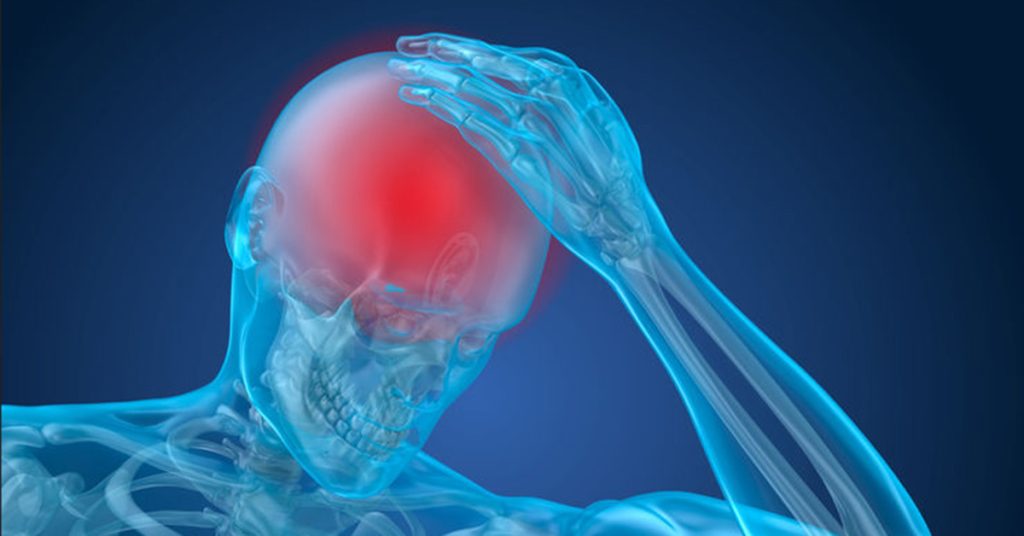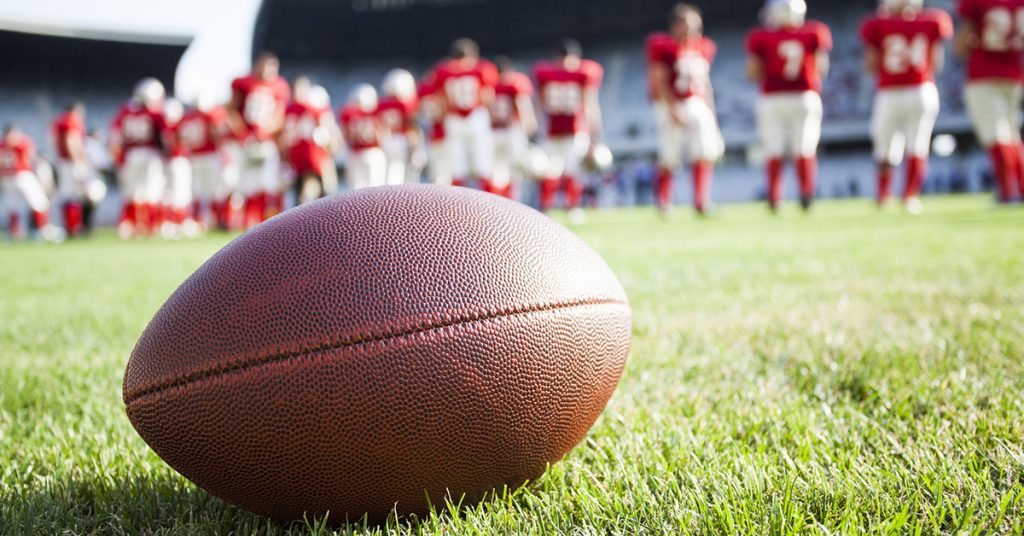Posts Tagged ‘traumatic brain injuries’
March is Brain Injury Awareness Month
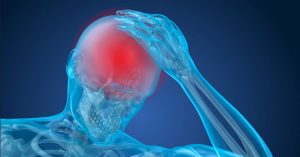
March is Brain Injury Awareness Month. Take the opportunity to learn
Today, there is greater awareness around brain injuries. As a result, many people are treating brain injuries earlier and living healthier lives.
The Centers for Disease Control and Prevention (CDC) observes Brain Injury Awareness Month in March, to provide education about potential concussion symptoms, ongoing research and the needs of those living with a brain injury. This comes at the right time for families, as many children and teenagers plan to participate in spring sports.
Many brain injuries are caused by car accidents, falls or violence. But over the past decade, we have learned more about young children and student athletes suffering concussions on the sports field. In fact, from 2010 to 2016, nearly two million children were treated in emergency rooms for sports-related traumatic brain injuries (TBI), according to the CDC website. Sports associated with the highest number of ER visits: football, cycling, basketball, playground activities and soccer.
Among males 17 and younger, football was involved in 27 percent of all sports-related TBI visits to the ER, more than any other activity. In the same age group, females playing soccer, playground activities and basketball made the highest number of ER visits for TBI. Among children under 5, playground activity resulted in the most ER visits for TBI.
As we continue learning about injuries to children and student athletes, research continues to show older Americans are highly vulnerable to brain injuries. They are the most likely to be hospitalized for TBIs, according to the CDC.
At Breakstone, White & Gluck, our attorneys encourage you to look at the CDC website so you can be informed about the symptoms of traumatic brain injury and concussion. If you observe symptoms in yourself or your children, immediately call your doctor to be examined. Also guide older family members to medical treatment. This is paramount because a brain injury left untreated can result in long-term impairment or death. When someone receives immediate treatment, effective diagnosis and management early on is critical.
What is a Traumatic Brain Injury?
According to the CDC, a traumatic brain injury can be caused by a bump, blow or jolt to the head. There are traumatic brain injuries and mild traumatic brain injuries, which are often called concussions.
What are the Symptoms of a Traumatic Brain Injury?
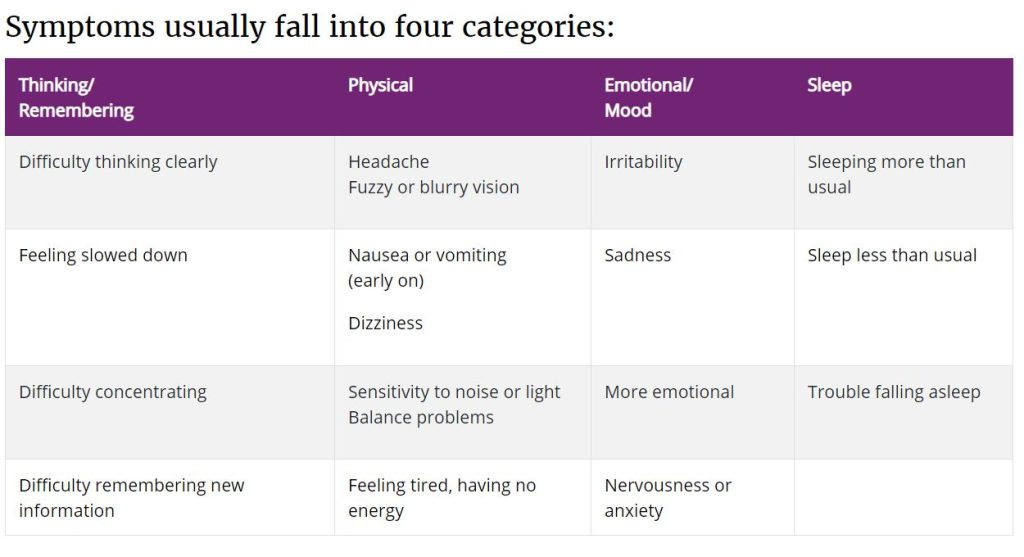
Concussion Symptoms. Courtesy CDC Website
You may observe some of these symptoms immediately after someone sustains a brain injury. Or symptoms may not emerge for several days. It’s also important to note that not everyone experiences the same symptoms.
Symptoms include difficulty thinking, concentrating or remembering or feeling slowed down.
Physical symptoms may include headaches, nausea, vomiting or fatigue. Some people are sensitive to noise or light. Others have trouble balancing themselves.
When someone suffers a head injury, it’s common for their sleep to be disrupted. They may sleep more or less than normal. Another sign is having trouble falling asleep. More extreme emotions are another symptom. The person may be irritable, sad, more emotional or exhibit high anxiety and nervousness.
Younger children may exhibit some of the above symptoms, but parents should also watch for crying inconsolably, more temper tantrums or getting easily upset and having trouble keeping up with skills they are learning (toilet training for instance). They may also lack interest in their normal activities.
Sports-Related Concussions and TBI in Massachusetts
Be aware of how concussions happen. After a car accident or truck accident, always receive immediate medical attention to make sure you have not suffered a TBI. When an elderly relative slips or a child falls on the playground, check in with the doctor. Do this anytime you observe someone suffer from any type of physical impact to the head.
When you sign your child up to play a sport, ask the coaches for the concussion protocol. In Massachusetts, middle and high schools are required to have documented procedures regarding concussion injuries and prevention. Passed in 2010, M.G.L. c.111 § 222 requires parents and students to participate in concussion awareness training so they can recognize symptoms and receive early treatment. The law also requires students to be removed from play if they may have suffered a concussion. They can only return with medical clearance.
Under the law, public middle and high schools and those subject to Massachusetts Interscholastic Athletic Association (MIAA) regulations must have concussion protocols. Other sports leagues are not required under Massachusetts law, but they should all have a concussion policy on their website.
Final Note
- At home, educate older children about TBI symptoms. Ask them questions when you sense something may be off and use the above chart to determine whether you may need to call the doctor.
- Ask for concussion safety protocols at schools and daycare centers, and when children participate in sports leagues. Attend concussion trainings.
- Watch younger children and older adults closely. Remember young children may not be able to communicate symptoms and pain with you and older adults may not recognize symptoms in themselves, especially if they have other medical conditions.
- Recruit as many family members as you can in watching for signs in young children, teens and the elderly.
- Visit some of the online resources below and share them with family members.
Concussion Prevention Resources for Families
Massachusetts Law on Concussion Prevention in Sports
105 CMR 201.00: Head injuries and concussions in extracurricular activities
Additional Resources
Heads Up to Brain Injury Awareness Training, CDC
Facts About Concussion and Brain Injury – Where to Get Help, CDC (a resource for all ages)
Sports Related Concussions and Head Injuries, Mass.gov
Concussion Trainings, Massachusetts Department of Public Health
Returning to School After a Concussion, Mass.gov
About Breakstone, White & Gluck – Boston Personal Injury Lawyers
With more than 100 years combined experience, Breakstone, White & Gluck of Boston is one of the most respected personal injury law firms in Massachusetts. Our attorneys represent individuals who have suffered traumatic brain injuries or mild traumatic brain injuries due to the negligence of another individual, organization or corporate entity.
If you have been injured, learn your legal rights for seeking financial compensation and obtaining medical care. For a free legal consultation, call Breakstone, White & Gluck at 800-379-1244 or 617-723-7676 or you can use our contact form.
More NFL Players are Self Reporting Concussion Symptoms
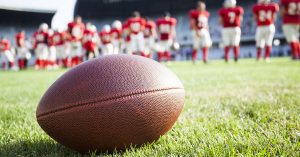 Professional football players face a high risk for concussions, far greater than most of us. But Rob Gronkowski’s concussion a few weeks ago was a reminder that concussions can happen when we least expect them, even in the middle of a big game. And when they do, the game must stop.
Professional football players face a high risk for concussions, far greater than most of us. But Rob Gronkowski’s concussion a few weeks ago was a reminder that concussions can happen when we least expect them, even in the middle of a big game. And when they do, the game must stop.
Much has changed over the past decade, as hundreds of former NFL players have sued over head injuries. Every state now has a concussion protocol for student athletes. In Massachusetts, students, coaches and parents are now trained to recognize concussion symptoms and how to respond. But others should also be aware of the risks. Beyond the playing field, concussions can happen in car accidents, construction accidents, falls and other situations.
Concussions are a mild Traumatic Brain Injury (TBI) which are often caused by an impact to the head. Concussions can be hard to recognize at first, with some initial symptoms mirroring the flu.
According to the Centers for Disease Control & Prevention (CDC), symptoms include:
- Headache or pressure in the head
- Temporary loss of consciousness
- Nausea and vomiting
- Fatigue and dizziness
- Confusion
- Slurred speech and/or a delayed response
Other symptoms may take a few hours or days to show, including poor concentration, memory problems, personality changes and sleep disturbances.
The NFL has specialists watch players for concussion symptoms. Last year brought a 16 percent increase in concussion reports. Yet there was one positive. Players self reported and initiated 28 percent of concussion evaluations in preseason and the regular season. This was up 9 percent. The NFL released these preliminary figures in January.
Though it was hard to see the Patriots fall in the Super Bowl, the increase in self-reported concussions is still a win. Here are some tips for concussion prevention beyond the football field:
Sports
Passed in 2010, Massachusetts’ concussion safety law requires students, parents, coaches and anyone involved in high school sports to be trained on how to identify the symptoms of a concussion. Students must be taken out of the game if they are injured and cleared by a doctor before they can return. Schools are required to report the number of concussions to the state.
This law provides a good foundation for educating the public about concussions and will protect students. If you are not a parent or student, you can find information about concussions online. The Mayo Clinic offers this resource.
Car Crashes
A high-impact traffic crash can cause head injuries and bruising you may not immediately see. Always receive medical treatment after a car accident. If you were traveling with a young child, it is essential. They may not be able to communicate the nature of their injuries. This is critical because car accidents are the leading cause of TBI-related deaths among children and young adults ages 5 to 24, according to the CDC.
Falls
Falls are the leading cause of TBI, with children and the elderly the most vulnerable, according to the CDC. Nearly half – 47 percent – of all individuals with TBI injuries who go to the emergency room, hospital or die have fallen.
There are a few steps you can take to prevent a concussion from being left untreated.
Adults who care for elderly parents can talk to them about the risks associated with falls and symptoms of a concussion.
First, let your parent know they should visit their medical doctor or an emergency room immediately after a fall. Then, do not assume they will. Many people are reluctant and unsure about going to a doctor. Let your parent know they can always call you and you will drive them.
Parents can protect young children by gating off staircases and laying down slip guards to prevent slips and falls. This is especially important for wooden staircases.
Stay informed about concussion policies at schools and daycare programs. Make sure your emergency contact information is up to date so the school can always reach you. On playgrounds, make sure your child is playing over soft material, not pavement. Give them an extra hand when venturing on new equipment for the first time. Steer them toward something else if they are not quite ready.
About Breakstone, White & Gluck
The Boston personal injury lawyers at Breakstone, White & Gluck specialize in representing clients in cases involving traumatic brain injuries. For a free legal consultation, contact our firm at 800-379-1244 or 617-723-7676 or use our contact form.


